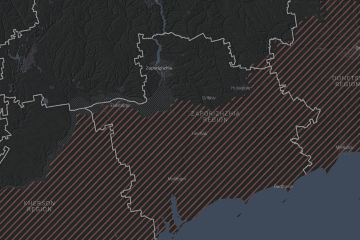- Category
- War in Ukraine
Holding Russia Accountable For War Crimes. Yes, We Can Actually Do It

Ensuring accountability for Russia's war crimes requires a collective effort. But there is a way to do it.
Images from Bucha, Irpin, Mariupol, and Kherson have now been seared into our collective memory. Razed cities, generations of Ukrainians massacred, and thousands of children kidnapped all paint a stark picture of the devastation caused by Russia’s invasion of Ukraine. The potential for widespread war crimes gone unpunished is massive.
Acknowledging these atrocities and seeking accountability is not just about punishment, it’s about upholding the principles that define the very essence of our humanity. It’s about sending a clear message: even in the chaos of war, violations of fundamental human rights will not be tolerated.
So what can be done?
Step 1: Understanding the Language of War
Before discussing accountability, it’s vital to understand the legal framework surrounding war crimes. These are not violations of local laws, but severe breaches of international rules safeguarding the core principles of humanity.
The establishment of the International Criminal Court (ICC) was a direct consequence of the events of World War II. The widespread and systematic nature of war crimes committed during that period exposed glaring gaps in the existing international legal framework. The ICC’s creation aimed to address these shortcomings, providing a permanent court dedicated to prosecuting individuals for the most serious crimes of concern to the international community.
The Rome Statute, the founding treaty of the ICC, defines four key categories of war crimes. It’s important to remember that these categories are not ranked in severity. They are all grave breaches of international law, but they define different types of crimes committed:
Crime of Aggression: This involves planning and initiating an illegal war of aggression, a grave act against the very foundation of peace and security.
War Crimes: These are violations of international humanitarian law, targeting civilians, medical facilities, and prisoners of war.
Crimes Against Humanity: Widespread or systematic attacks against civilians, encompassing horrific acts like murder, torture, and sexual violence.
Genocide: The intentional destruction of a national, ethnic, racial, or religious group. This goes beyond physical killings and includes actions aimed at erasing the group’s existence.
Step 2: Matching Evidence with Crimes
Now it’s time to put a face to the name. Russia’s crimes are numerous and well-documented. For example, the International Humanitarian Law enshrined in the Geneva Conventions protects individuals caught in crossfire. However, towering evidence shows that Russia has blatantly disregarded these principles. Hospitals bombed in Mariupol, civilians fleeing through designated humanitarian corridors shelled in Irpin, and reports of torture and summary executions in Bucha—these are just a few examples of Russia’s actions in Ukraine.
More worryingly, alarming trends emerge when considering genocide. Widely reported systematic targeting of Ukrainian cultural sites, forced deportations of Ukrainian citizens, kidnappings, and forced assimilation raise serious concerns. Organizations like the ICC and the UN’s Independent International Commission of Inquiry on Ukraine are meticulously collecting evidence, and building a case for potential war crimes, crimes against humanity, and genocide.
Step 3: Breaking the Silence
Acknowledging these atrocious crimes demands a shift in narrative. Soft language or offering platforms for justifications without critical scrutiny allows for harmful ambiguity when dealing with war crimes. Unambiguous language—calling out crimes by their proper names—serves as a vital step towards accountability. It educates the public, mobilizes support for justice, and pressures leaders to act.
Step 4: Prosecuting the Aggressor
Recognition alone isn’t enough. Prosecuting those responsible sends a powerful message: even in the chaos of war, fundamental human rights violations will not be tolerated. It’s about delivering justice to victims, preventing future atrocities and upholding the rules-based international order.
Mechanisms like the ICC and the International Court of Justice (ICJ) play crucial roles. The ICC focuses on individuals, while the ICJ adjudicates disputes between states. Gathering evidence, building legal cases, and navigating complex jurisdictional issues are crucial parts of this pursuit. Establishing an international tribunal specifically for Ukraine’s case is vital. Trying Russia for its crimes is vital.
Step 5: Taking Collective Responsibility
Accountability extends beyond courtrooms. Civil society organizations play a vital role in documenting abuses, advocating for victims, and raising awareness. Holding decision-makers accountable through public pressure and international diplomacy is equally crucial.
Ultimately, ensuring accountability for Russia’s war crimes requires a collective effort. By leveraging legal mechanisms, public pressure, and diplomatic channels, we can strive to deliver justice for Ukraine, deter future atrocities, and send a clear message: war crimes will not be tolerated in the 21st century.
Step 6: Getting Involved
While the situation in Ukraine feels overwhelming, there are powerful steps you can take to make a difference. Don’t underestimate your ability to influence change. Here’s what you can do:
Contact your elected officials and urge them to support international efforts to hold Russia accountable.
Donate to grassroots organizations working on the ground in Ukraine, providing humanitarian aid and documenting human rights abuses.
Raise awareness on social media by sharing credible information and calling for justice.
Together, we can ensure that the atrocities committed in Ukraine are not met with silence, but with action and accountability.
cover photo: Vitalii Yurasov @yurasov.pro
-5adb65e550f9dec24a01a35019e4b6b5.jpg)

-29a1a43aba23f9bb779a1ac8b98d2121.jpeg)

-0666d38c3abb51dc66be9ab82b971e20.jpg)
-35249c104385ca158fb62273fbd31476.jpg)


-554f0711f15a880af68b2550a739eee4.jpg)